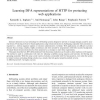60 search results - page 2 / 12 » DFA Learning of Opponent Strategies |
ICML
2003
IEEE
14 years 6 months ago
2003
IEEE
A satisfactory multiagent learning algorithm should, at a minimum, learn to play optimally against stationary opponents and converge to a Nash equilibrium in self-play. The algori...
ATAL
2010
Springer
13 years 6 months ago
2010
Springer
Video games provide a rich testbed for artificial intelligence methods. In particular, creating automated opponents that perform well in strategy games is a difficult task. For in...
ICCBR
2005
Springer
13 years 11 months ago
2005
Springer
While several researchers have applied case-based reasoning techniques to games, only Ponsen and Spronck (2004) have addressed the challenging problem of learning to win real-time ...
ATAL
2011
Springer
12 years 5 months ago
2011
Springer
We develop an algorithm for opponent modeling in large extensive-form games of imperfect information. It works by observing the opponent’s action frequencies and building an opp...
CN
2007
13 years 5 months ago
2007
Intrusion detection is a key technology for self-healing systems designed to prevent or manage damage caused by security threats. Protecting web server-based applications using in...

